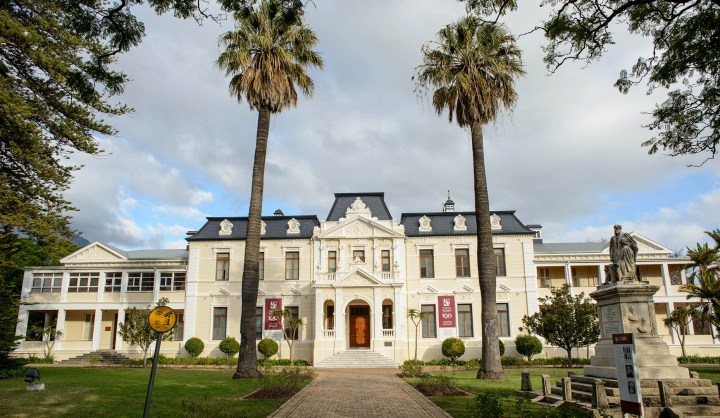MOTHER-TONGUE LEARNING OP-ED
SAHRC report on language issue at Stellenbosch University is deeply flawed

Two eminent law scholars explain why they believe the SA Human Rights Commission report on Stellenbosch University’s language policy is fundamentally flawed.
A report issued by the South African Human Rights Commission (SAHRC) on 14 March found that Stellenbosch University (SU) violated several constitutional rights of Afrikaans-speaking students. This finding was based on certain incidents that occurred during the opening weeks of the 2021 academic year in a handful of university residences.
It was alleged that student leaders in four university residences (out of a total of 31) and one private student organisation (“PSO”) residence instructed students to use only English during the two-week welcoming programme. The university has clearly stated that an instruction not to use Afrikaans or indeed any other language would be inconsistent with the university’s 2016 Language Policy, and indeed its new 2021 Language Policy. It has committed itself to an ongoing investigative and rectification process arising out of the events during the 2021 welcoming week.
The complainants to the SAHRC, the Freedom Front Plus and DA MP Dr Leon Schreiber, have welcomed the findings on what they refer to as “the discriminatory ban on Afrikaans” and noted their intention to call for the removal of the vice-chancellor, Professor Wim de Villiers.
Leaving aside the hyperbole that has become a staple of university language debates, the SAHRC report requires careful and critical scrutiny. In our view, there are some serious flaws in law, logic and reasoning in the report, which question the soundness of the eventual findings.
More importantly, the SAHRC’s approach in the report threatens to undermine larger, pressing debates about the continued inequality in South African higher education. Specifically, it threatens to overshadow the imperative to accelerate unfolding transformation initiatives at SU in the wake of the findings of the report of the Khampepe Commission of Inquiry into Allegations of Racism at Stellenbosch University (25 October 2022).
In our view, there are three fundamental flaws in the SAHRC report.
Weak recording and analysis of evidence
First, the report fails to detail or assess in any systematic manner the evidence that was presented to it during the inquiry process. Not only is it not stated who testified, but it is not even stated how many testified.
Scattered references are made throughout the report to testimony that students at certain residences were instructed not to speak Afrikaans when interacting with fellow students in the residences, including in social interactions. At the same time, it acknowledges that it received testimony on behalf of the affected residences that there was no intention to ban Afrikaans, but rather to request English to be spoken during the welcoming period as this was the most commonly understood language and would lead to fewer students feeling excluded during the welcoming event.
The commission fails to record or to assess all the evidence presented to it on the ground that “doing so may lead to unnecessary disputes of fact and draw out the process without cause”. It is unacceptable for a body such as the SAHRC to make the serious finding pursuant to its statutory powers that the university infringed on a range of students’ constitutional rights without a balanced summary and assessment of all the evidence presented to it.
Flawed contextual and legal analysis
Second, the report fails to take into account the broader historical and sociopolitical context of South Africa and Stellenbosch University. In fact, the report seems completely divorced from the broader South African reality. For example, one astoundedly reads (in para 6.3.7) that:
“The Commission is cognisant of the fact that, in the Western Cape in particular (as well as the Northern Cape), Afrikaans is the mother tongue of many rural and underprivileged people, particularly in the black and coloured communities … If SU is to open its doors to the more underprivileged in our society, and in particular the underprivileged youth, it must be borne in mind that, for many underprivileged and rural youths, these doors can only remain truly open if Afrikaans remains not only a reasonably practicable language of academic learning, but also a respected language of communication in other contexts within university life.”
Surely, the same type of reasoning could be applied, and with even more force, in relation to “many rural and underprivileged people, particularly in the black and coloured communities” that speak a language other than Afrikaans? In our view, the commission’s reasoning here presents a highly skewed picture focusing only on the rights of Afrikaans-language speakers in two provinces. This highly selective context-setting also leads directly the commission to the astounding statement in para 7.2.7 of the report that “a blanket limitation on the use of languages other than English, even over a short period, is unlikely to protect more rights than it is sure to limit”.
Such a far-reaching “conclusion” could only have been reached by a narrow focus only on mother-tongue Afrikaans speakers in the Western and Northern Cape, and ignoring the rights of other language users and the role of Stellenbosch University as a public university serving students throughout South Africa. In our view, Prof De Villiers is spot-on when he stated (as also quoted in the report) that the complainants “pay no regard to the facts and are apparently oblivious to the complexities associated with implementing multilingualism at a large higher education institution.” Sadly, it seems that the commission fell into this same trap.
The same narrow and skewed focus is evident in the commission’s finding that the incidents during the 2021 welcoming week at the residences in question had a disproportionate impact on Afrikaans-speaking students because they constituted the vast majority of non-English-speaking students at SU. No mention is made of the human rights of the African students at Stellenbosch University who are not Afrikaans-speaking and have borne the brunt of historical discrimination and exclusion from the university.
The commission’s skewed contextual analysis in turn results in a very thin analysis and application of the constitutional right to equality and to be free from unfair discrimination. This is at odds with the rich substantive equality jurisprudence of the Constitutional Court. The commission characterises the objective of the Stellenbosch University residences to be “inclusive” as being “a noble societal goal, but not actually a human right or legal requirement” (para 7.3.5). In so doing, it ignores the constitutional imperative to redress the injustices of the past and to ensure equal access and participation, particularly for groups who were historically disadvantaged and experience ongoing patterns of marginalisation.
Measures to promote inclusion and equal participation in a context such as Stellenbosch University are not simply attempts to be nice and welcoming (ie, social inclusivity). Rather, such measures are essential to protect and advance groups (black students) who were disadvantaged by unfair discrimination (due to their historical exclusion from SU). Understood thus, measures to promote inclusion are essential to achieving the full and equal enjoyment of human rights such as education, rather than being, as the commission’s report implies, separate from or in tension with human rights.
The finding that the university had a policy
Third, the finding that the events described above indicated that the university had a policy to ban the speaking of Afrikaans is based on flawed logic and reasoning. The commission found that the event which occurred in the residences took place “without any official consent by SU”; that the SU explicitly rejected these practices as “wrong”, and contrary to its Language Policy at the time; that the residences never “received direct instructions from the [SU] to do so” nor “were [they] operating under direct instruction from any higher authority within SU”; there were no disciplinary consequences attached to failing to adhere to the request to speak English only; and that there was no “collective or organisational planning between” the relevant residences in these practices.
Nevertheless, the report frames these practices as a policy of the residences, ostensibly purely on the report’s view that these practices involved some measure of peer pressure for students to comply.
In our view, it is highly problematic to typify failures to act consistently with relevant university policy (in this case the 2016 Language Policy) as a “policy” of the university. This conflates an official policy with the non-implementation of that policy, which is a logical inconsistency.
Based on this flawed logic, the report concludes that SU violated students’ human rights since what happened in these residences amounted to “a policy … that was being practised by SU” and that SU “implemented a policy that sought to regulate what language students were allowed to speak”.
The report’s failure to appreciate the distinction between the operative policy (viz the SU Language Policy) and conduct that amounted to non-adherence to this policy (the incidents at the relevant residences during the opening two weeks of 2021) is perhaps most evident when the report aims to place the blame for these practices on the Language Policy itself. In paragraph 6.4.1, the report explicitly confirms that the 2016 Language Policy does not promote or even allow these practices. Then, in the very next sentence, the report seems to suggest that these practices were “implemented… as a result, either directly or in pursuance of the spirit” of the policy. The logic seems to be that the Language Policy simultaneously did not allow these practices and resulted in the practices. This is patently absurd reasoning.
As is evident from the analysis above, we are of the view that the SAHRC’s report is deeply flawed on several bases. The real risk, however, is that it may undermine important, ongoing processes of transformation at SU (and other higher education institutions) as the institution continues its journey from discrimination and exclusion to equality and inclusion in service of all South Africans. It is noteworthy that the SAHRC is completely silent on this journey and its importance as underscored in the Khampepe report. DM/MC
Geo Quinot is a professor of law in the Department of Public Law and School of Public Leadership at Stellenbosch University. Sandra Liebenberg is a professor and HF Oppenheimer Chair in Human Rights Law at Stellenbosch University. They write in their personal capacities.
This article was first published in News24. It has been republished with their kind permission. Find the original article here.
This article was also published on News24 in response to this article.


















expecting anything rational/ logical from the sahrc is like expecting integrity, honesty and good governance from the anc